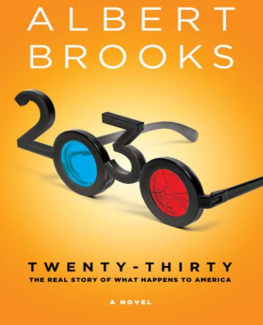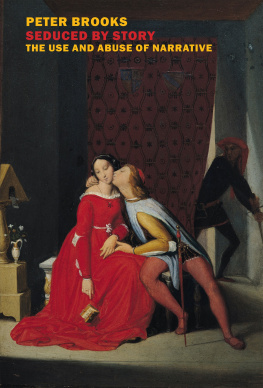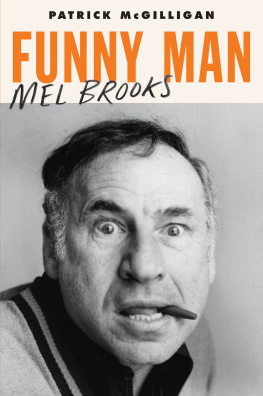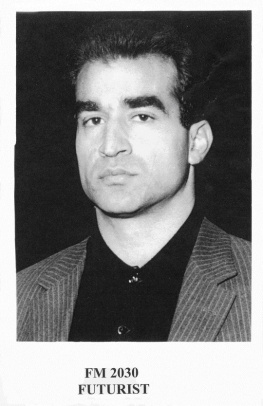Albert Brooks - 2030: The Real Story of What Happens to America
Here you can read online Albert Brooks - 2030: The Real Story of What Happens to America full text of the book (entire story) in english for free. Download pdf and epub, get meaning, cover and reviews about this ebook. year: 2011, publisher: St. Martins Press, genre: History. Description of the work, (preface) as well as reviews are available. Best literature library LitArk.com created for fans of good reading and offers a wide selection of genres:
Romance novel
Science fiction
Adventure
Detective
Science
History
Home and family
Prose
Art
Politics
Computer
Non-fiction
Religion
Business
Children
Humor
Choose a favorite category and find really read worthwhile books. Enjoy immersion in the world of imagination, feel the emotions of the characters or learn something new for yourself, make an fascinating discovery.
- Book:2030: The Real Story of What Happens to America
- Author:
- Publisher:St. Martins Press
- Genre:
- Year:2011
- Rating:4 / 5
- Favourites:Add to favourites
- Your mark:
- 80
- 1
- 2
- 3
- 4
- 5
2030: The Real Story of What Happens to America: summary, description and annotation
We offer to read an annotation, description, summary or preface (depends on what the author of the book "2030: The Real Story of What Happens to America" wrote himself). If you haven't found the necessary information about the book — write in the comments, we will try to find it.
2030: The Real Story of What Happens to America — read online for free the complete book (whole text) full work
Below is the text of the book, divided by pages. System saving the place of the last page read, allows you to conveniently read the book "2030: The Real Story of What Happens to America" online for free, without having to search again every time where you left off. Put a bookmark, and you can go to the page where you finished reading at any time.
Font size:
Interval:
Bookmark:

For my wife, Kimberly, and my children, Jacob and Claire
CONTENTS
It was a normal day, or so it seemed. Actually, nothing in 2030 seemed normal, not to Brad Miller anyway. Brad was surprised at how many people showed up for his eightieth birthday. Surprised because he had these friends in the first place and surprised at how healthy they all were. This was not what people in their eighties were supposed to look like. Sure, the lifts helped, along with the tucks and the hair and the new weight-loss drug, which, while only seven years on the market, had become the biggest-selling drug in the history of the world. Thats what happens when a chemical works almost one hundred percent of the time, in everyone. But still, Brad thought, these folks look good.
And they did. They were thin, healthy, all looking better than their parents were at forty. The only thing missing were younger people. Brad couldnt remember the last time hed seen a young person at his birthday. Other than his son, whom he never talked to anyway, he didnt even know anyone under fifty. Nor did any of his friends. There was just too much resentment and too much fear.
As the lights dimmed, the customary life movie played in the middle of the room, holographic style. People were getting tired of these. It was one thing to watch home movies of someone else; it was another to feel like you were in them. It was like boredom squared. But people watched; they laughed and told Brad how much fun it was to see him age. He, like many of them, actually looked better now than he had ten years ago. But it was funny. Where once that was a compliment relating to how you lived your life, whether you ate well or exercised enough or got a good nights sleep, now it was just about what you could afford. And once cancer had been cured, the youth business went crazy.
Most people in that room were only in their twenties when Richard Nixon declared a war on cancer. Like all the wars going on at the time, this one seemed to have little success. The progress was so slow. Still, people held out hope that when they got older there would be a cure for what ailed them. But when the year 2000 rolled in, there they were: bald, fat, and ugly. And there was still cancer.
But everyone in that room, probably everyone in the world, remembered where they were when they heard the news. Oh, there had been so many hopeful stories over the years. So many false starts. So many mice that were cured, but when the human trials started, people dropped dead of all kinds of things that had never bothered a mouse. But then it happened. And like all of the greatest discoveries, from Newton to Einstein, Dr. Sam Muellers cure was so exquisitely simple.
* * *
Dr. Mueller was no genius. He grew up fairly normal, in Addison, Illinois. A big night out was going to Chicago for pizza. After graduating Rush Medical College, Sam Mueller interned at Rush-Presbyterian-St. Lukes Medical Center and then, realizing that making a living as an internist was going to be tough at best, he started looking elsewhere. He thought of concierge medicine, which was all the rage, but decided to take a fairly lucrative position at Pfizer. He figured he would do that for a while and then something would unfold. Oh my, did it unfold.
Mueller had always been interested in the immune system. So much in medicine was pointing to the bodys own defenses as a cure-all, but the success rates were modest at best. He was assigned various projects at Pfizer. Some were interesting, some he hated. He never understood the Viagra-for-women thing. Every woman he ever knew could go all night, have a bowl of cereal, and go for another afternoon, but he worked on it anyway, and when it happened it was huge.
The team got big-time bonuses and raises and all kinds of rewards. They were even sent to Hawaii, where Sam Mueller met his wife. She wasnt Hawaiian, she was an assistant on the project whom he had never really gotten to know, but then one night on Kauai they both got drunk, walked on the beach, watched the most beautiful sunset in the world, and fell madly in love.
Maggie was a great companion for Sam. Smart, easygoing, and very supportive. He could talk to her about his ideas and she would not only listen but also encourage him. The idea she liked most was an interesting one. Something about using a persons own blood to attack cancer cells. Sam was convinced that if a persons blood was combined with someone elses blood that wasnt compatible, if the combination of the two was just right, one persons blood cells would fight not only the other blood cells but the foreign bodies in their system as well, including the cancer. But the real break came when Pfizer merged with a Swiss firm and Sam was let go. Thank God he never told anyone there about what he was working on or they would have owned it.
With Maggies help, Sam Mueller raised three hundred thousand dollars, took on a partner, and started Immunicate. His blood idea was in the right direction but it didnt work properly; it knocked out cancer cells but attacked the other organs, too, and the bodys immune system went into overdrive, killing everything. Something had to be done to make the blood combination work against the disease without working against the rest of the body. The answer turned out to be common amino acids.
Sam and his partner, Ben Wasser, spent an entire year injecting the blood with different aminos. With the help of computers they tried millions of combinations. There were so many months where they felt it was not going to work. And then on the night of June 30, 2014, they put together alanine, isoleucine, proline, and tryptophan. Four common amino acids that had never been combined before, certainly not in this precise measurement.
Two years later, over ninety-four percent of the participants in the human trials were cancer-free. There were still rare cancers that did not respond, but all the big ones were knocked out, and the success was so overwhelming that trials were stopped early and the drug was available to the general population by the spring of 2016.
Kathy Bernard was just five years old when she heard about the cure for cancer. It meant very little to her, although she wondered if her grandfather would benefit. She didnt really like her grandfather, but she didnt really like anyone. She was voted angriest girl in her sixth-grade class.
Some of the reasons were obviousdivorce, a lot of fighting in the family, a stepbrother who was a freeloader, a verbally abusive motherbut there was something else. Something that she felt even as a small child watching her family move down the ladder. Her father and mother both losing their jobs, owing more money than they had, her birthdays becoming less and less of an event. She simply felt that her generation was getting the short end of the American dream. And she wasnt the only one her age who felt that way.
Kathy started hanging around with a gang when she got into her teens. Not a typical gangthese kids didnt kill each other or go to prison or even get arrested. They were smart and pissed. They all felt they were getting screwed by their country. They didnt hate any particular race, although if you mentioned the legal illegals, you would start a fight. What they really hated the most was the whole idea that their lives were going to be tougher than those of their parentssomething that had never happened before in America.
When Kathy was very young, her father, Stewart Bernard, seemed secure in his job, but that was only because she didnt really understand the situation. He worked, like his father before him, for General Motors. But unlike his father, the last ten years of Stewarts employment were filled with uncertainty. The family moved from Missouri, where he had a job building Chevy vans, to Kansas, where he worked on Malibus, to Tennessee, where he had the misfortune to build Saturns, which GM decided to just stop making altogether.
Font size:
Interval:
Bookmark:
Similar books «2030: The Real Story of What Happens to America»
Look at similar books to 2030: The Real Story of What Happens to America. We have selected literature similar in name and meaning in the hope of providing readers with more options to find new, interesting, not yet read works.
Discussion, reviews of the book 2030: The Real Story of What Happens to America and just readers' own opinions. Leave your comments, write what you think about the work, its meaning or the main characters. Specify what exactly you liked and what you didn't like, and why you think so.











